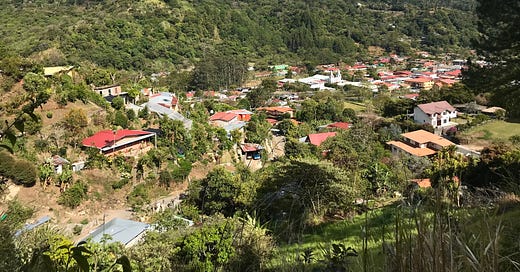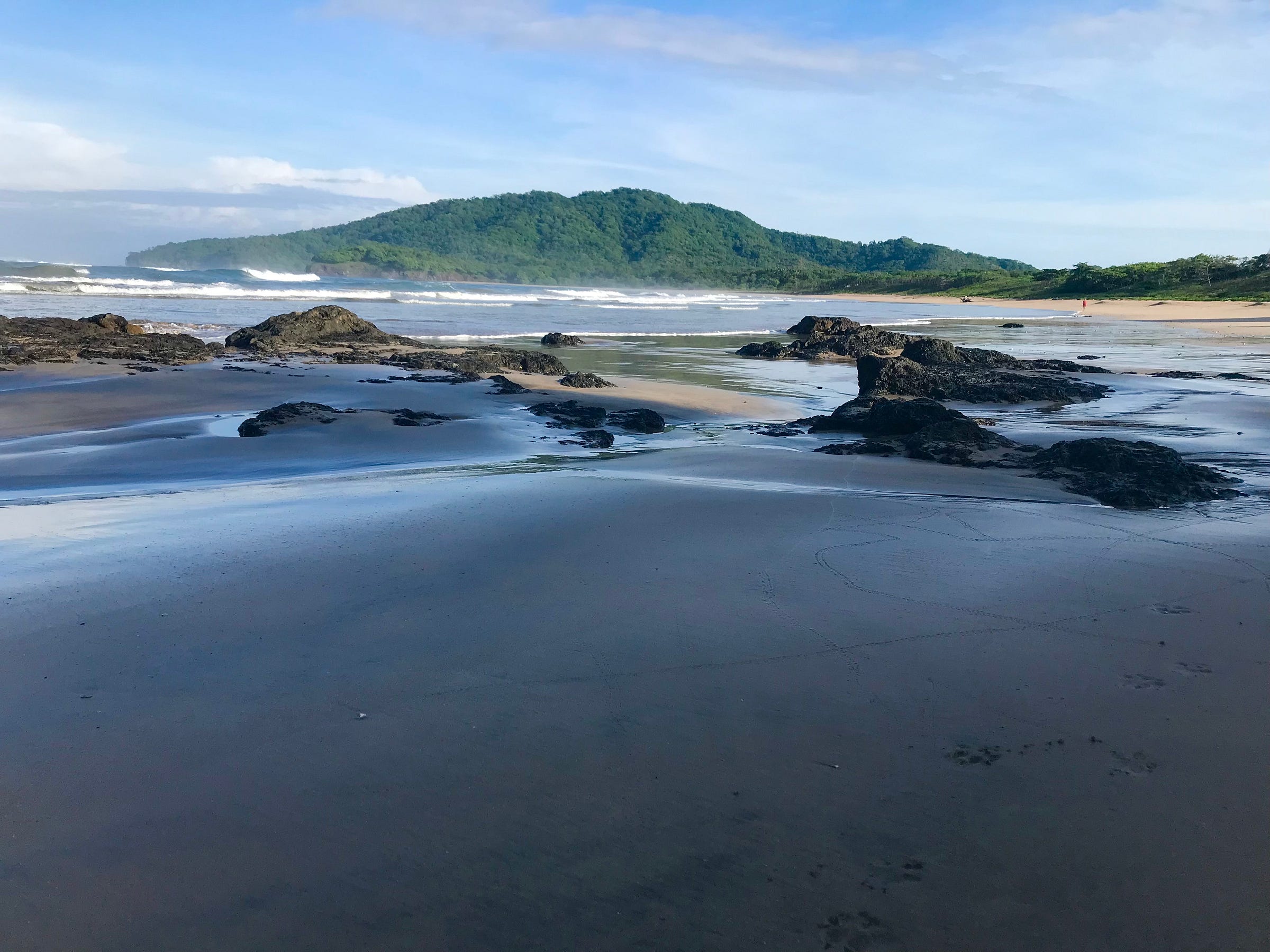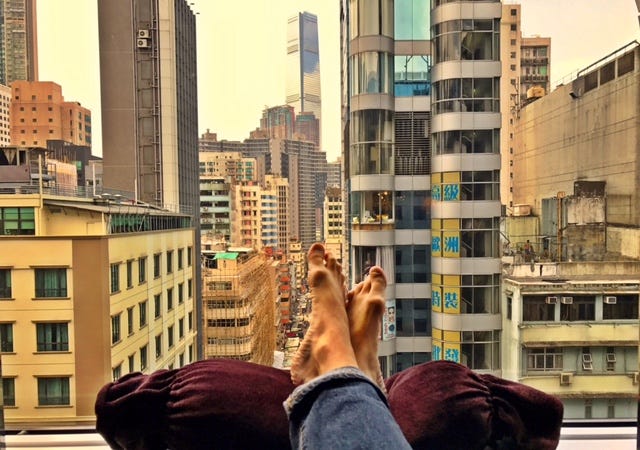A Season in Boquete, Panama
From the earliest age, I have always had an incurable case of wanderlust– something calling me out into the greater world to explore. It all began as a little boy when my mom would read me “Henry the Explorer” by Mark Taylor.
The colorful book was about a young boy named Henry and his faithful dog, Angus McAngus. Each morning, Henry would prepare a lunch, pack his backpack, and head out into the world, exploring with Angus. I have always found this story to be a metaphor for my travels.
My earliest adventures began at age 17 and took me to California, Hawaii, Denmark, Norway, Sweden, and several countries throughout Asia. These earliest experiences ignited an internal desire that has never left me, sending me on a quest to live more simply outside the norm of our hectic, modern consumer culture in America. This journey has taken me on adventures to China, Hong Kong, Costa Rica, and South Korea, culminating in a year of solitary mindful living in a tiny Japanese house in Kyoto in 2019. I have now traveled to 14 countries over the years.
If you had asked me three years ago, I never would have guessed that I would become an expat. I am easily a decade away from “retirement,” although that is a term that is almost a foreign word for people of my generation. At that time, I was living the year of my dreams in Kyoto, Japan, walking among the gardens and temples each day, studying painting and calligraphy, on a never-ending mission to find the best ramen in town.
Then I returned abruptly to the States after news broke of the pandemic around the world. For 15 months, I desperately tried to assimilate back into the way of life in America with no success. It became very clear that this was a path and place I had left behind, and it was now time to chart a new course and direction in the greater world. I knew by now that 80% of the world offered me the opportunity to live more simply and cheaply than the U.S, but did not know where I would ultimately end up.
The first leg of my journey led me to Costa Rica on a one-way ticket. Costa Rica was a place I had fallen in love with over a decade ago on my first solo journey. Its “Pura Vida” way of life, in accordance with the rhythm and tide of nature, was a natural fit for the simple way of living I sought. I spent a slow, quiet season along the Guanacasta coast immersed in one of the “Blue Zones” of the world, the home of some of the longest living people on the planet.
An invitation had been extended for me to oversee eight Airbnb rentals for some South African friends who were longtime residents of Costa Rica. I immersed myself in the simplicity of life there, walking for miles along the beach at sunrise, living healthfully off of a fish and vegetable truck, surrounded by nature. However, like many of the best love affairs, the season came to an end and so did my tourist visa. I would need to leave Costa Rica for Nicaragua, Panama or perhaps Colombia, then return if Costa Rica was going to become my expat home.
It was about this time that I learned of a place called Boquete, Panama. During my initial research, Boquete sounded almost too good to be true. It offered almost all of the elements I had clarified over my many years of travel as my ideal living environment. I was simply looking for a place where I could live life on my terms.
Boquete, Panama offered the following:
Natural Surroundings: Having grown up in an urban environment, I discovered the healing power of living in balance with Nature while living the year in Kyoto, Japan. The Japanese live by a spiritual principle of blending their homes and buildings in accordance with the natural environment, while honoring the trees and elements. This had such a profound effect on my overall experience and well-being. It had long been at the top of my requirement list for an ideal place to live. This is difficult to find in the chaotic expansion of modern day America.
Boquete is an almost idyllic natural environment. It sits in a valley at 1200 feet above sea level, surrounded by Panama’s most mountainous region and untouched cloud forests. A year-round temperature of 74 degrees and its multiple microclimates surrounding the town make it the ideal environment for over 900 species of birds and some of the best coffee grown anywhere in the world.
Water: In considering my ideal location, I knew I must be near water. In my home city of Austin, Texas, my favorite form of exercise and meditation was taking my stand-up paddleboard on the section of the Colorado River that runs through the center of town at dawn. Boquete is perfectly situated along the Caldera River at the base of the Baru Volcano. This offers a number of hikes along the cascading river, as well as two bridges in the center of town overlooking the water. Waterfalls throughout the mountainous surroundings are also plentiful.
Small Community Population (20,000): Having spent much of my life in larger metropolitan cities, I was hoping to find a place with fewer people. Before leaving the U.S., I considered moving to places like Asheville, NC and Bend, Oregon, which offered more modest populations, but still were growing rapidly. Boquete offered a smaller population of 20,000 with a unique mix of local Panamanians, the indigenous Ngábe Bugle people of the region, and an international expat community.
International mix of people: The first settlers of Boquete came from other areas of Panama, followed by immigrants from other countries such as Switzerland, Sweden, Germany, and North America. Today, you will find travelers passing through from countries all over the world who seem to be drawn to this unique place.
Access to Ocean: Boquete is located just an hour and a half from the white sandy beaches of the Pacific, and less than 4 hours from Bocas del Toro in the Caribbean.
Art, Music, Library, Tai chi, Meditation and Yoga: As a writer and painter, I needed to live in a location that would offer an environment conducive to my passions. Also, as a practitioner of meditation, Tai chi and Yoga, my ideal location would at least support these practices through opportunities to connect with others in these communities. Boquete offers opportunities to connect with writing groups and meditation communities, as well as fellow Tai chi and Yoga practitioners. The Biblioteque de Boquete “library in Boquete” offers a quiet, beautiful space to write or work, as well as a large selection of English titles for inspiration.
Access to Good Food: As a result of its diverse international expat population, Boquete has developed numerous excellent restaurants with varied menus from other cultures. My second day here, I discovered ramen on par with that of Kyoto, as well as a local organic store offering many familiar brands from the likes of Whole Foods and Trader Joe’s in the U.S. This allows me to cook mostly at home inexpensively. One can also eat at the cafeteria where the locals dine for just a few dollars.
Inexpensive Cost of Living: $350-450 Rent: One of the main reasons I left the U.S for a much simpler way of life was due to the unsustainable cost of living in a country that is rapidly moving the other direction. In my home city of Austin, “the next Silicon Valley”, the cost of housing escalated 43% in one year during 2020. For many like myself, this makes it an unsustainable place to live or create a future, as is now the case with many places throughout the U.S. Here in Boquete, I live in a small casa on top of a mountain, overlooking the valley of Boquete, surrounded by coffee, citrus trees, and all variety of birds. I pay $450 per month which includes furnishings, electricity, heat, and water, as well as internet. As a writer and digital nomad, this provides an excellent location for me to work remotely.
Walkable City: My ideal location will always be a walkable city. In Kyoto, I lived just a couple of narrow blocks from the Kyoto Imperial Gardens at the center of the ancient city. On the corner of my street was a train stop that would allow me to be in Tokyo by dinner if I left in the morning. In Kyoto, I covered over 600 miles on foot and bike. Recently, I sold my fuel burning car, which was collecting dust in a parking lot back in the U.S.. I have now lived for the past 6 months without need for a vehicle. Boquete is an easily walkable city with access to anything you might need in the center of town. From my casa on the mountain, it’s a 5 mile walk downhill into Boquete; however, taxis are readily available for just a few dollars.
My expat journey over the past 3 years has been a winding, unpredictable adventure. For this season, it has now landed me in the beautiful mountains of Boquete, surrounded by the indigenous people of Panama. As I write this article, I can hear the Ngábe women outside my window, washing their laundry against the rocks while laughing and singing. I now travel the world lightly and simply, living out of one bag with my laptop and a pour over coffee filter. Only time will tell if Boquete proves to be the ideal location for which I have long been searching.
Experience and travel throughout many countries have taught me that there is no ideal location, only the one you create wherever you are.
above article as published in International Living
I have now traveled to 14 countries and over the years a handful of themes and spiritual truths about the underlying nature of the world have continually emerged. My earliest adventures began at age 17 and took me to California, Hawaii, Asia, Europe, Denmark, Norway and Sweden.
These earliest experiences ignited an internal journey that has never left me, a quest to live outside the norm of our hectic consumer culture and has taken me on epic adventures to China, Hong Kong, Costa Rica, South Korea, Japan, culminating in a year of mindful living in solitude in a tiny Japanese house in Kyoto.
I now write these words from a simple cabin on top of a mountain surrounded by nature in Boquete, Panama where I live surrounded by the indigenous people of the Chiriqui Valley. I live simply, grow and process my own coffee, and I write.
This whisper of the soul has always been further fueled by a longing for a much more simple and peaceful way of living in this modern world, a path which treads quietly and leaves a small, peaceful footprint.
On these pages, I share my observations of kindness and beauty from my adventures in the world and invite you to listen quietly for the call within you to explore the places that beckon your soul.
Thank you for reading and joining the journey,
Kirk
A good traveler has no fixed plans and is not intent upon arriving. A good artist lets his intuition lead him wherever it wants.
Zen and Ink Journals represents hundreds of hours of writing over the past decade, sometimes from a train in remote China or a coffee shop in Kyoto, a hammock in Costa Rica or a simple cabin on a mountain in Boquete, Panama.
Zen and Ink Journals is a simple offering of words in the hope of inspiring others to a simpler, more mindful way of life in these chaotic times. I invite you join me each month on the journey for a glimpse of the larger world, reflections on living more simply and quietly amidst the chaos of our modern world.
Please consider foregoing a cup of coffee each month and becoming a monthly subscriber.
If you would like to support Zen and Ink as a Founding Member or prefer a one-time Donation you may select the Founding Member option and enter any amount you choose. Please know your gift carries a ripple effect in the world and helps sustain the journey.
For more information and ways to connect with me, visit my website at Zen and Ink
Zen and Ink was born over a decade ago out of my own personal journey to find peace and tranquility amidst the ever-increasing chaos of our modern world. In the last ten years, the pace of our modern world has only accelerated and we have moved further out of sync with nature and the rhythm of our souls. Zen and Ink offers a quiet space for anyone along their journey seeking more balance and Zen in their daily lives.
Zen and Ink provides an oasis for those who are drawn to a slower and simpler way of life; to provide a portal for awakening, tools and resources that many will find useful in their own quest to find the Zen which is already there and always within and around each of us.








